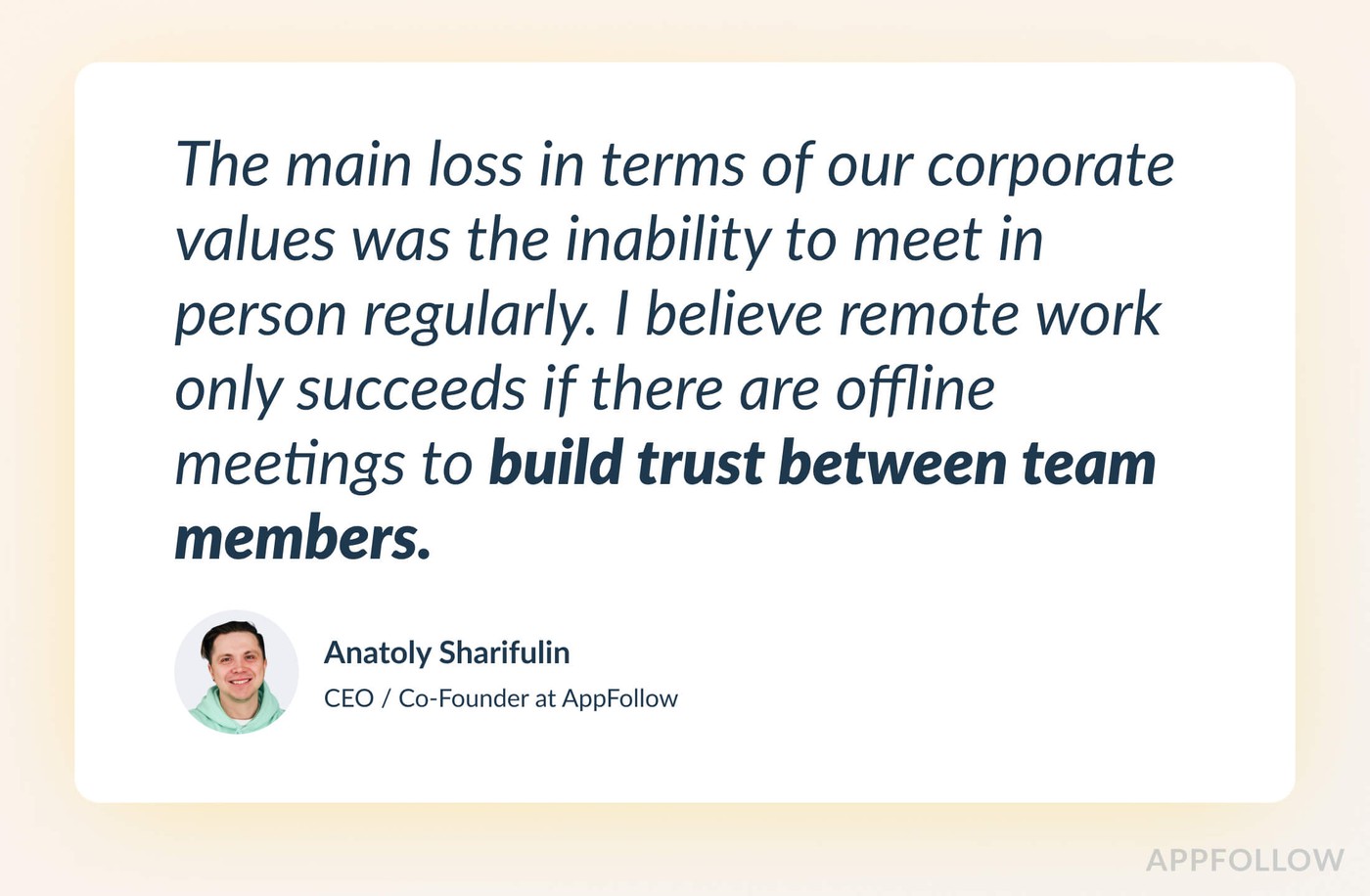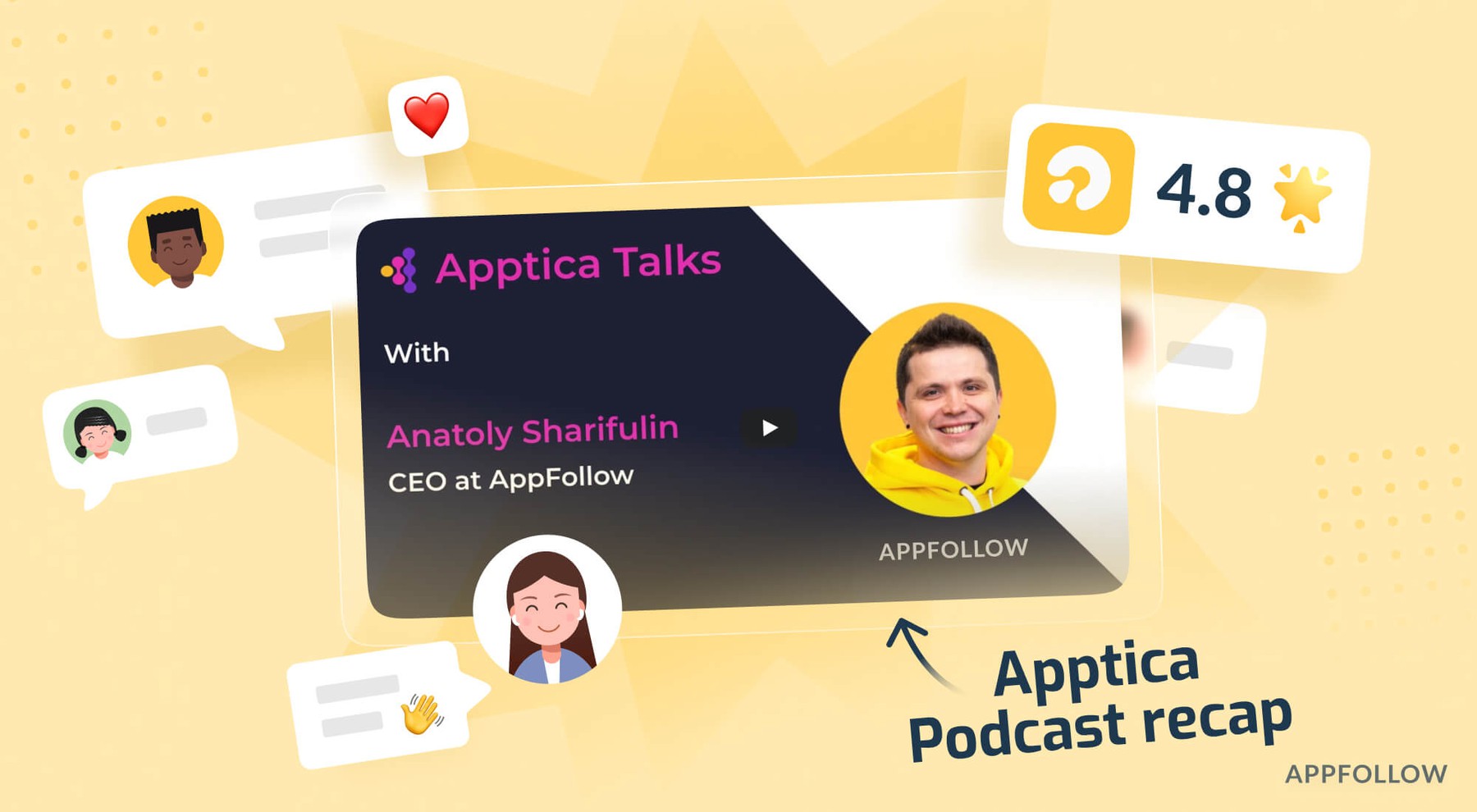AppFollow’s journey of yesterday, today, and tomorrow

Table of Content:
Time for a story from the Chief himself. I’m Anatoly Sharifulin, CEO of AppFollow, and recently I participated in the Vision to Venture podcast hosted by Theo Forest and Tom Goldberg. Growing a product from an idea and up to something that continues to scale up and deliver more value to customers is never easy. One Black Swan event after another test the mettle of even the most seasoned entrepreneurs—I went through that too. This is my story and how our team made AppFollow continue to weather the storms that keep on coming.
Nurturing an idea into an enterprise
I became an entrepreneur eight years ago.
AppFollow is my first venture. Before that, I was a backend developer and an early adopter of all things apps. Seeing the first iPhone, I recognized that developing for App Store and Google Play was an exciting and lucrative direction.

Now, we focus on app reputation to improve ratings, establish connections with users, and uncover product insights in a market with millions of apps and billions of daily users.
The journey
Even after 10 years, the real challenge remains in promotion and user acquisition.
That's why before AppFollow was founded, I transitioned from a local team of developers to a travel startup, similar to booking.com, serving the CIS market as a Product Manager. My task was to build the best hotel booking app for this market.
To succeed, I monitored competitor reviews and ratings weekly. This helped us understand user pain points, likes, dislikes, and feature requests. These insights helped us shape our product strategy and acquire more users.
The core idea came up when together with my CTO, we built an app with a feature for capturing reviews at a hackathon in 2014. Six months later, along with our third co-founder, we validated this idea at a conference and decided to start a business, launching in 2015. Thus, AppFollow was born!
With more ambition than resources, we started as a small team that could effectively communicate remotely. This model worked well until the company grew to a team of 80 individuals, sprawled across 27 diverse nations from the Americas to Asia.
This growth brought about significant changes—and challenges.
Building a bridge over the COVID-19 pandemic
If you see a business that is still running, you can assume it has survived a lot of problems. It’s the same for us.
Entering the era of the COVID-19 pandemic, we were a team of 60 individuals, harmoniously working across many countries and communicating in a single language that wasn’t English. Since we began as a remote-first company, we were well-prepared to continue hiring from different locations and maintaining a strong remote culture.
The pandemic, however, was disruptive, particularly for travel apps. We lost some travel-related customers for up to a year. Despite this, our growth accelerated. We raised our Series A during a challenging time when investors were hesitant about the online format and much was uncertain.

The challenges of remote work
Striking a balance in remote work culture is a delicate task. We know that the key lies in a balance of online and offline interactions. Regular in-person leadership meetings, asynchronous functional team meetings, and company-wide gatherings at least once or twice a year play a big role in maintaining our team's cohesion.
To make this happen, we developed hubs in several locations, including Finland, Georgia, Armenia, the UK, and the USA. The objective was to hire and relocate people around these hubs to allow regular in-person meetings whenever possible. This approach helped us maintain the human connection—the backbone of any thriving team.
To reduce the feeling of isolation that can come with remote work, we encouraged video calls and maintained an "open door" policy, where anyone could reach out to anyone else in the company for a chat or consultation. We made sure that every new member felt welcomed and understood the company's values and culture.
Downtime is another aspect we highly value. We encourage regular vacations and days off to maintain a proper work-life balance. Burnout is real, especially when times are tough.
The test of war
Prior to the conflict between Russia and Ukraine, we had a majority of our team based in Russia. Since our product has a global customer base, we started investing in establishing new hubs. When the conflict escalated, we offered relocation support to our team due to the high risk to both our business and their personal lives. Unfortunately, not all team members accepted the offer and we lost members of our product and DevOps teams.
This sudden loss forced us to prioritize maintaining the team's morale, causing us to invest time not just in business growth but also in team motivation. All team members, regardless of their location, felt the stress of the situation. 8 out of the top 10 Russian banks were using our product, but due to the conflict, we had to terminate these contracts as well. This was a significant loss since Russia was our original market.
Relocating the team to various parts of Europe was stressful for everyone involved. To mitigate this, we provided financial support, particularly for the initial phase of the move. We helped with legal advice and shared information on applying for visas and immigration. We're now working on adjusting our budget to maintain fair compensation and provide additional support for the team.
Our language barrier became apparent as our team expanded. We had 110 people from 10 different countries, and English wasn’t the native language for most of them. To ensure that language wouldn't become a barrier to communication, we organized free English classes. We also encouraged our team members to help each other out and communicate as much as possible and use language learning apps such as Duolingo. Every bit counts!
Securing the financial horizons
The ongoing conflict has indeed significantly impacted the investment landscape.
Our preparations for our Series B round were significantly disrupted by the onset of the conflict. Potential investors raised concerns about the risk posed by team members still in the process of leaving Russia and our previous connections with Russian customers. Even after addressing these issues, we encountered hesitations due to Russian origins.
We had to halt our expansion plans, which was a setback as we were prepared to scale and increase hiring post-Series B funding. Investors now prioritize stability over rapid growth, as much is unclear once again. Deal cycles in SaaS businesses are longer, and valuations have dropped.
That’s why we have shifted our focus to customer loyalty and retention. We are investing more in our product and adapting our strategies to ensure business survival in these challenging times. In light of the conflict and COVID-19, we made the difficult decision to focus on stability as well as innovation.
The future ahead
The biggest challenge is keeping up with our competitors, who have not been as affected by the war. They have been able to execute nearly similar features and value to customers. For us, it's critical to invest in innovation, dedicating roughly 20% of our product engineering costs to it. With the current hype in AI, we've launched some AI capabilities for our product—this is a great value addition.
As for App Follow's future, our mission remains understanding and elevating app reputation. The experience helped us realize that maintaining our team's health and happiness is as important as maintaining our business growth. We've moved beyond online reputation and are now focusing on app reputation, ratings, and review management in app stores. Some of our customers have started asking about B2B review platforms, and we're also looking to aggregate these reviews.

The stronger the bridge, the easier it is for us to cross any future chasms that may come our way. Looking ahead, we are more resilient and better prepared to face the unknown.
Feel free to check out my latest posts on LinkedIn, and if you have any questions about my leadership role or the AppFollow endeavor so far, drop me a line. Thanks for reading!
Turn bad reviews into opportunities with smart brand reputation monitoring strategies - here's how.







